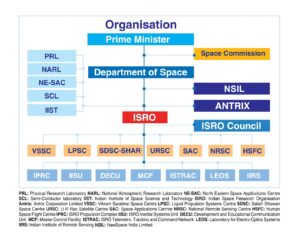In News
- ISRO has postponed the Young Scientist Programme (YUVIKA) 2020 scheduled between May 11 and 22 due to nation-wide lockdown caused by the outbreak of Novel Coronavirus (COVID-19) pandemic.
About Young Scientist Programme
- The programme is primarily aimed at imparting basic knowledge on Space Technology, Space Science and Space Applications to the younger ones with the intent of arousing their interest in the emerging areas of space activities.
- According to ISRO, the programme will be of two weeks duration during summer holidays and the schedule will include invited talks, experience sharing by the eminent scientists, facility and lab visits, exclusive sessions for discussions with experts, practical and feedback sessions
- It is proposed to select 3 students each from each State/ Union Territory to participate in this programme covering CBSE, ICSE and State syllabus.
- There are a few seats left for the programme and it is proposed to select through online registration.
- Those who have just completed 9th standard and are waiting to join 10th Std (or just joined 10th Std) will be eligible for the online registration.
- The programme includes 2 weeks residential training, involving 4 centers of ISRO viz. VSSC, URSC, SAC and NESAC and a visit to SDSC, SHAR as a part of the programme.
Eligibility criteria
- Those who have finished class VIII and currently studying in class IX can apply for the programme.
- The selection is based on academic performance.
- Students from rural areas have been given special weightage in the selection criteria.
- Three students from each state/Union Territory will participate in this programme every year covering CBSE, ICSE and state-board syllabus.
ISRO
Vision
- Harness space technology for national development, while pursuing space science research and planetary exploration.
Mission
- Design and development of launch vehicles and related technologies for providing access to space.
- Design and development of satellites and related technologies for earth observation, communication, navigation, meteorology and space science.
- Indian National Satellite (INSAT) programme for meeting telecommunication, television broadcasting and developmental applications.
- Indian Remote Sensing Satellite (IRS) programme for management of natural resources and monitoring of the environment using space based imagery.
- Space based Applications for Societal development.
- Research and Development in space science and planetary exploration.
Objective
- Operational flights of Polar Satellite Launch Vehicle (PSLV).
- Developmental flight of Geo-synchronous Satellite Launch Vehicle (GSLV- Mk II).
- Development of heavy lift Geo-synchronous Satellite Launch Vehicle (GSLV-Mk III).
- Design, Development and Realization of Communication Satellites.
- Design, Development and Realization of Earth Observation Satellites.
- Development of Navigation Satellite Systems.
- Development of satellites for Space Science and Planetary Exploration.
- Earth Observation Applications.
- Space based systems for Societal Applications.
- Advanced Technologies and newer initiatives.
- Training, Capacity building and Education.
- Promotion of Space technology.
- Infrastructure / Facility Development for space research.
- International Cooperation.
Organisation Structure

Source: isro.gov.in
















